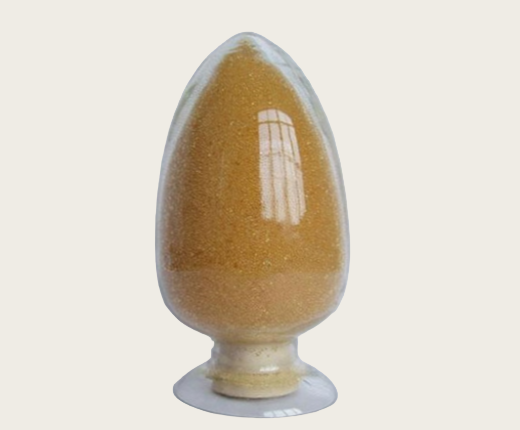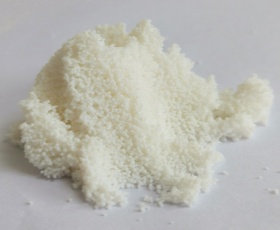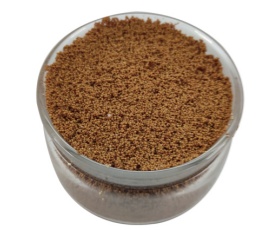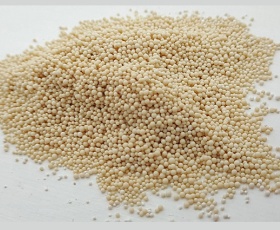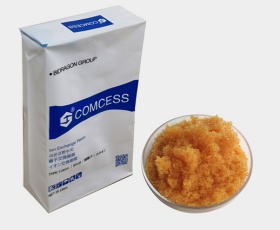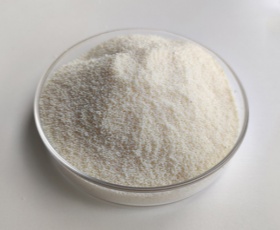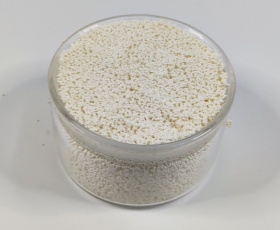COMCESS Nuclear Grade Ion Exchange Resin Series
Nuclear-grade ion exchange resin is widely used in the nuclear power industry. This ion exchange resin has very high purity standards and can meet the strict water quality requirements of the nuclear power industry. Nuclear-grade ion exchange resin is a high-purity ion exchange resin that must undergo special processing and transformation methods. The preparation requirements of nuclear-grade ion exchange resin are much higher than those of ordinary ion exchange resin.
Introduction
Nuclear-grade ion exchange resins are mainly in the form of microspheres. They are mainly divided into two categories: cation exchange resins and anion exchange resins.
Cation exchange resins are made of styrene and divinylbenzene containing sulfonic acid groups. The hydrogen ions carried by the sulfonic acid groups can exchange with all cations they come into contact with. Anion exchange resin is made of styrene and divinylbenzene containing quaternary ammonium groups. The hydroxide ions on the quaternary ammonium groups can be exchanged with various anions they come into contact with.
The term "nuclear-grade" specifically refers to the extremely high quality standards of ion exchange resins, originally used exclusively in nuclear power plants. To ensure consistent quality and guaranteed effluent quality, nuclear-grade ion exchange resins are typically not regenerated.
Cation exchange resins are made of styrene and divinylbenzene containing sulfonic acid groups. The hydrogen ions carried by the sulfonic acid groups can exchange with all cations they come into contact with. Anion exchange resin is made of styrene and divinylbenzene containing quaternary ammonium groups. The hydroxide ions on the quaternary ammonium groups can be exchanged with various anions they come into contact with.
The term "nuclear-grade" specifically refers to the extremely high quality standards of ion exchange resins, originally used exclusively in nuclear power plants. To ensure consistent quality and guaranteed effluent quality, nuclear-grade ion exchange resins are typically not regenerated.
Advantages
Excellent physical and chemical stability and good temperature resistance, good selectivity and high exchange capacity
With excellent separation ability, high mechanical strength and excellent anti-penetration shock performance, for special purposes
Application
1. Preparation of feed water and cooling water for nuclear power plants.
2. Purification of primary reactor water and treatment of secondary reactor coolant water.
3. Treatment of secondary reactor condensate.
4. Treatment of steam generator wastewater.
5. Treatment of nuclear power plant wastewater.
6. Treatment of radioactive waste from nuclear power plants.
Technical Parameter
| Brand No. | Type | Ionic form | Moisture content (%) | Volume complete exchange capacity (mmol/ml) | Bulk density (g/ml) | Main application |
| C100N | Gel strong acid | H+ | 50~60 | ≥1.8 | 0.75~0.85 | 1) Make-up water system; 2) Condensate system; 3) Internal cooling water system; 4) Steam generator sewage system; 5) Reactor coolant (primary loop) system; 6) Wastewater treatment system, etc. For example: 1. Used in water-water power reactor cation bed, anion bed water purification device (distillate re-purification) and water purification device; 2. Used in water-water reactor cation bed water purification unit-5 (under hydrazine ammonia chemical conditions); 3. Cation bed water purification device for regeneration of high-power pressurized tube reactor; 4. Used in combination with anion resin for mixed bed water purification device for regeneration of high-power pressurized tube reactor; 5. Mixed bed condensate purification device used in conjunction with anion resin for regeneration of high-power pressurized tube reactors; 6. Used in conjunction with anion resin in non-renewable mixed bed chemical water purification equipment, etc. |
| C2007Li N | Gel strong acid | 7Li+ | 43~53 | ≥2.0 | 0.80~0.90 | |
| C300N | Gel strong acid | H+ | 45~55 | ≥2.1 | 0.78~0.88 | |
| UC650N | Gel strong acid | H+ | 46~56 | ≥2.0 | 0.76~0.86 | |
| UC6507Li N | Gel strong acid | 7Li+ | 43~53 | ≥2.0 | 0.80~0.90 | |
| UC1600N | Gel strong acid | H+ | 37-47 | ≥2.4 | 0.80~0.85 | |
| UA500N | Gel strong base | OH- | 55~65 | ≥1.0 | 0.66~0.71 | |
| A500BN | Gel boron type strong base | BO33- | 38~58 | ≥1.0 | 0.65~0.75 | |
| UA550N | Gel strong base | OH- | 55~62 | ≥1.1 | 0.65~0.75 | |
| MB200 Li N | Gel mixed bed | H+/ OH- | 45~65 | ≥0.6 | 0.68~0.78 | |
| MB500N | Uniform particle mixed bed | H+/ OH- | 45~65 | ≥0.6 | 0.68~0.78 | |
| UMB550N | Uniform particle mixed bed | H+/ OH- | 45~65 | ≥0.6 | 0.68~0.78 | |
| RS-U | Macroporous resin | SO42- | 52~68 | ≥0.75 | 0.66~0.76 | Mainly used for adsorption, separation and recovery of uranium, strontium, thorium and rhenium. |
| RS-Cs | Adsorption media | Special groups | 20~30 | ≥10 (mg/g(dry)) |
1.03~1.1 | It is mainly used for the treatment of radioactive element cesium in nuclear power wastewater, and can also be used for the extraction, separation and purification of cesium and rubidium in salt lake brine for resource reuse. |
| RS-Sr | Adsorption media | Special groups | 20-30 | ≥10 (mg/g(dry)) |
1.03~1.1 | Mainly used for the treatment of radioactive element strontium in nuclear power wastewater. |
Request a Quote


